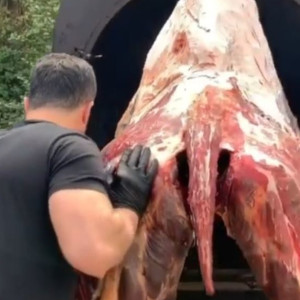You visit one of your regular Food News sources one fine morning and the first post on their list is about ‘How To Roast’ A Whole Camel’. What is your immediate reaction? Do you wretch in disgust and run for the bathroom? Or do you gaze with prurient curiosity at the photo?
 Smoked Camel is a delicacy in his part of the world.
Smoked Camel is a delicacy in his part of the world.
Doesn’t matter. Either way, you’re human. But your reaction does say something about how you see life, the world, and all the creatures in it. And it will probably strongly inform your next action – which, for many will be to write a nasty comment or e-mail; to the posters for condoning – nay, promoting – such barbarity.
But if the guy in the photo is a restaurateur from Turkey, and he does this all the time because his customers want it, and in his part of the world it’s just a normal, every-day event, you really ought think twice before hitting the ‘SEND’ button.
Culture clash
Some people from certain parts of China would say we’re crazy for keeping Dogs as pets. After all, they think of dogs as livestock, the same way as we think of chickens. I remember reading how Chinese authorities banned the sale of Dog, Snake Meat, Roasted Insects and other traditional delicacies from Beijing during the 2008 Olympics, in an effort to avoid grossing out foreign visitors.
And in Taiwan, where there is a growing animal rights movement, I noted their passage of a law forbidding the consumption of both Dogs and Cats.
Back to the Bactrian
I’ll admit that my first reaction, to the photo of the whole skinned Camel being slid into a huge, purpose-built steel roasting oven, was of mild shock and disorientation. But I soon segued to curiosity and wanted to know why the thing was being roasted whole as opposed to being parted-out for a variety of cooking methods.
Not so for 700-plus readers of the food blog where the story originated:
“I’m never eating meat again.”
“This is truly sick.”
“I see why people are eating less meat. This looks sick.”
“Unfollowing”
“No one wants to see this shit.”
A bunch of hypocrites
But the writer who posted the story in the first place, and followed with the post on the hostile reaction from readers, says that proves we’re all just a bunch of smug hypocrites.
“Aren’t we the same country that does whole hog barbecue, whole roast pork, and salivates over whole roasted ducks with nary a peep of backlash or vitriol aimed at anything and anyone?” asks blogger Reach Guinto. “Isn’t there a viral epidemic going around of folks lining up and acting an outright fool over [Popeye’s] chicken sandwiches? […] The same lot of us up in arms over the sight of an entire camel being cooked are often the same ones waiting in line for a chicken sandwich.”
The takeaway
Which is all to say that we may react negatively to people who don’t look like us, speak our language or worship the way we do. It’s not a hate reaction, of course; it’s a fear reaction. Fear of the unknown. And that same fear is what triggers our strong reactions over the idea of people eating Dog or Snake or Camel. What’s normal for folks in other parts of the world may be seem disgusting to us. But don’t forget, some of our dietary habits and customs may seem equally outrageous to them.
Thus endeth today’s lesson.
For homework, go out to your closest Peruvian restaurant and enjoy a bowl of Guinea Pig Stew!
~ Maggie J.

